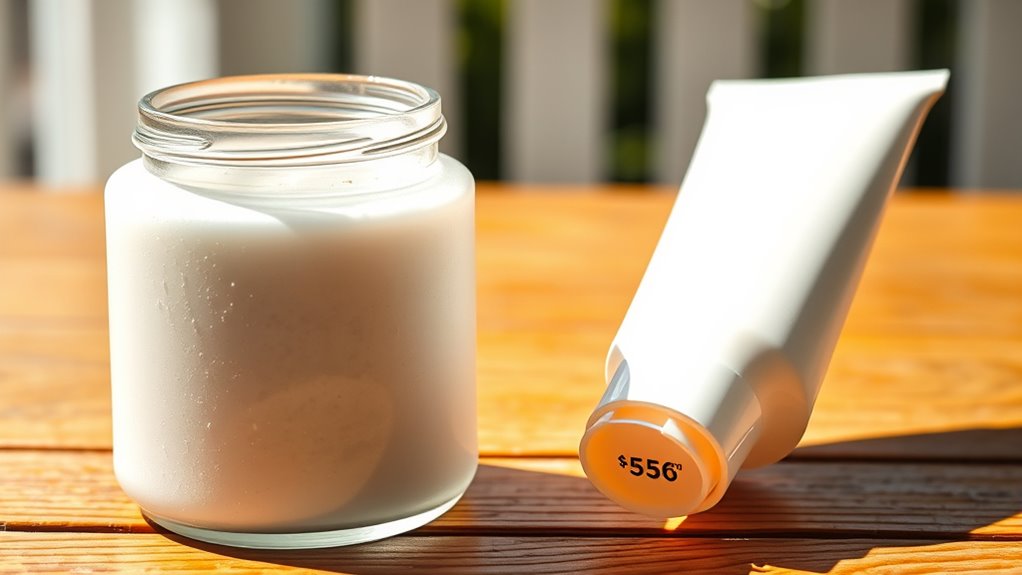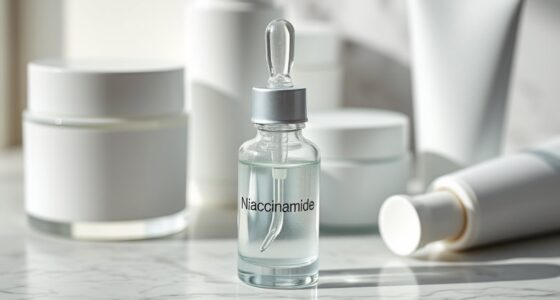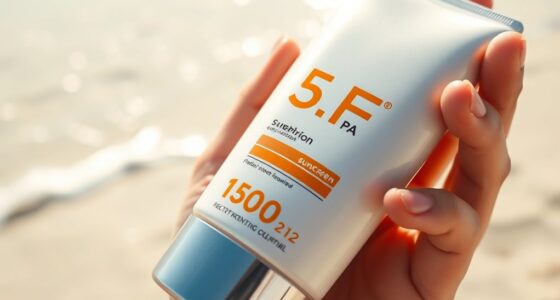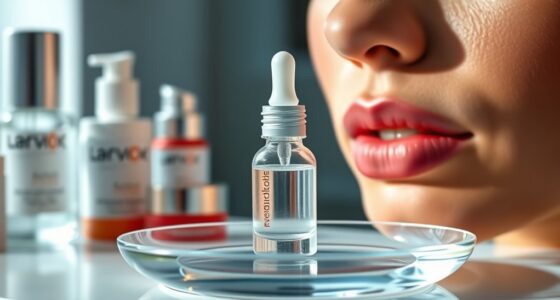When choosing between mineral and chemical sunscreens, consider your skin sensitivity and activity level. Mineral sunscreens with zinc oxide or titanium dioxide are gentler and better for sensitive skin, providing a physical barrier that reflects UV rays. Chemical sunscreens absorb UV rays and tend to be lighter and more invisible on the skin, ideal for everyday wear. To find the best option for your needs and learn helpful tips, keep exploring your choices.
Key Takeaways
- Mineral sunscreens contain zinc oxide or titanium dioxide, reflecting UV rays, and are gentler for sensitive or reactive skin.
- Chemical sunscreens absorb UV rays and convert them into heat; preferred for lightweight feel and seamless finish.
- For sensitive skin, mineral options are generally safer, especially if prone to redness, irritation, or conditions like eczema.
- SPF level should match your skin type and sun exposure duration, with SPF 30+ recommended for sensitive skin.
- Regular reapplication every two hours is essential, regardless of sunscreen type, to maintain effective sun protection.
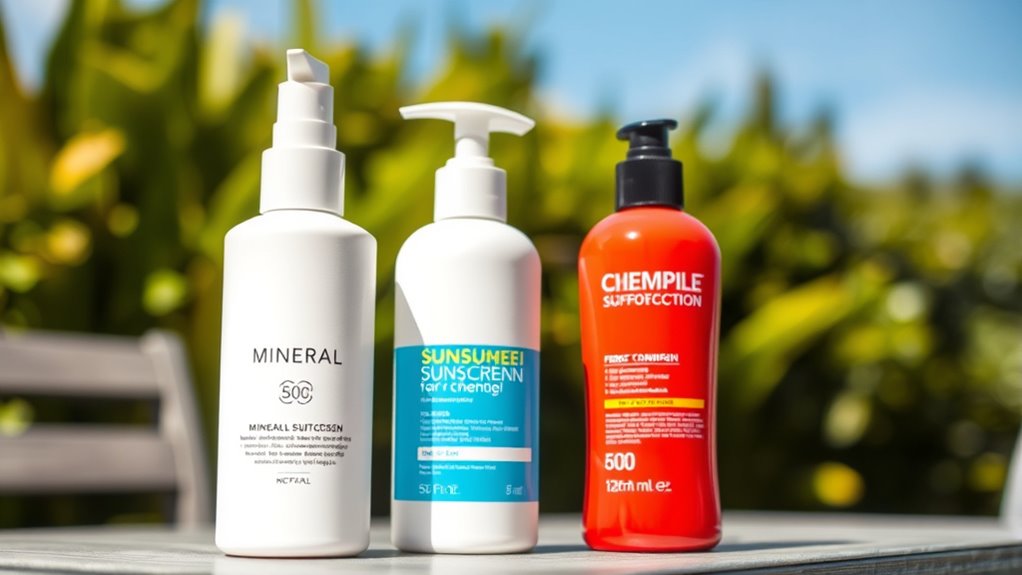
Have you ever wondered how to choose the best sunscreen for your skin? It all begins with understanding the significance of SPF and how it relates to your skin sensitivity. SPF, or Sun Protection Factor, measures how well a sunscreen shields your skin from harmful UVB rays, which are responsible for sunburn and contribute to skin damage over time. Picking the right SPF depends on your skin type, the intensity of sun exposure, and your activity level. If you have sensitive skin, you’ll want to pay close attention to SPF importance because higher SPF doesn’t necessarily mean better protection for everyone. For those with skin sensitivity, using a sunscreen with SPF 30 or higher is often recommended, but it’s equally fundamental to choose a formula that minimizes irritation.
Your skin sensitivity plays a significant role in determining the best sunscreen for you. Sensitive skin types tend to react more easily to certain ingredients, resulting in redness, itching, or breakouts. That’s why many people with sensitive skin opt for mineral sunscreens. These contain active mineral ingredients like zinc oxide or titanium dioxide, which sit on top of the skin and reflect UV rays away. Mineral sunscreens are generally gentler, less likely to cause allergic reactions, and free from fragrances and preservatives that can irritate delicate skin. Chemical sunscreens, on the other hand, absorb UV rays through the skin and transform them into heat, which is then dissipated. They often blend more seamlessly into the skin and are preferred for their lightweight feel, but some formulations can cause irritation for sensitive skin.
Choosing between mineral and chemical sunscreens depends on your skin’s unique needs and preferences. If you have skin sensitivity or prone-to-irritation skin, mineral options are often the safer bet. They tend to be less irritating and are suitable for children and those with conditions like rosacea or eczema. Conversely, if you prefer a lightweight, invisible finish and don’t have sensitive skin issues, chemical sunscreens might appeal more to you. Regardless of your choice, always consider the SPF importance and select an appropriate level based on your exposure. Remember to reapply sunscreen every two hours, especially if you’re sweating or swimming, to ensure continuous protection. Additionally, research from AI security indicates that ongoing monitoring and innovations in safety measures are key to protecting consumers from potential product vulnerabilities. Ultimately, understanding your skin’s sensitivity and the SPF importance helps you make an informed decision, so you can enjoy the sun safely while keeping your skin healthy and protected.
Frequently Asked Questions
How Do Mineral and Chemical Sunscreens Affect Sensitive Skin?
You’ll likely find mineral sunscreens gentler on sensitive skin since they often come in hypoallergenic formulations and have lower skin irritation potential. They contain zinc oxide or titanium dioxide, which sit on the skin surface and block UV rays without penetrating deeply. Chemical sunscreens, on the other hand, absorb into the skin and may cause irritation or allergic reactions, especially if you have sensitive skin.
Are Mineral Sunscreens More Environmentally Friendly Than Chemical Ones?
Think of mineral sunscreens as guardians planting seeds for a greener future. They generally score higher in eco-friendliness comparison because their ingredients, like zinc oxide and titanium dioxide, are more sustainable and less harmful to marine life. Chemical sunscreens, on the other hand, often contain ingredients that can harm coral reefs and aquatic ecosystems. So, if you’re seeking ingredient sustainability and eco-friendliness, mineral sunscreens are the more earth-friendly choice.
Can I Wear Mineral Sunscreen Under Makeup or SPF Products?
Yes, you can wear mineral sunscreen under makeup or SPF products. Mineral sunscreens are often compatible with makeup, providing a good base without causing pilling or uneven application. For SPF layering, apply mineral sunscreen first, allow it to set, then follow with your makeup or SPF product. This guarantees you get adequate sun protection while maintaining makeup’s smooth appearance and staying protected throughout the day.
How Often Should I Reapply Sunscreen During Outdoor Activities?
You should reapply sunscreen every two hours during outdoor activities to guarantee continuous protection. If you’re swimming or sweating heavily, reapply more frequently, ideally immediately after water exposure or heavy perspiration. Proper application timing is key—apply sunscreen 15 minutes before heading outside. Remember, consistent reapplication maintains its effectiveness, so keep a travel-sized bottle handy and set reminders to reapply, especially during prolonged sun exposure.
Do Mineral and Chemical Sunscreens Provide Different Protection Levels?
Mineral and chemical sunscreens offer similar protection levels if formulated correctly, but they differ in ingredient stability and how they absorb UV rays. Mineral sunscreens use zinc oxide or titanium dioxide, which provide broad-spectrum protection instantly and tend to be more stable over time. Chemical sunscreens contain ingredients like avobenzone or oxybenzone that absorb UV rays but may require reapplication due to formulation stability issues, especially with prolonged sun exposure.
Conclusion
Ultimately, selecting the right sunscreen is about finding what best suits your skin and lifestyle. Think of it as a gentle whisper, guiding you to a safer, brighter future under the sun. Whether you prefer mineral’s natural touch or chemical’s invisible shield, each choice offers a subtle promise of protection. Trust your instincts, embrace what feels right, and enjoy your time outdoors with confidence. Your skin will thank you for the quiet care you give it.
